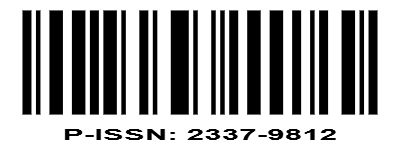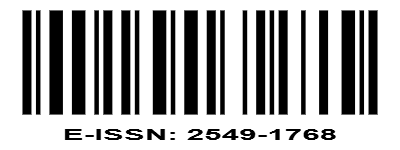LICHEN IN THE AREA OF IE SEU UM OF MESJID RAYA DISTRICT ACEH BESAR REGENCY
DOI:
https://doi.org/10.22373/biotik.v9i2.10860Keywords:
lichen, crustose, foliose, and Ie Seu umAbstract
Crust moss (lichen) is a symbiotic organism between fungi and algae which play important roles in environment and can grow in extreme conditions. Therefore, those are important issues to be concerned. The study was aimed to identify the lichen species and their substrates in the Ie Seu um area of Mesjid Raya District, Aceh Besar Regency. This research used exploratory survey methods. Observations were done at radii of 10, 20 and 30 meters from the hot spring. The parameters of the study were lichen species, types of thallus and substrate. Besides, the parameters consisting of air temperature and humidity, and light intensity were also measured. Data was analyzed descriptively and was revealed in tables and figures. The results showed that there were 16 lichen species consisting of 7 species (at radius of 10 meters), 6 species (at radius of 20 meters), and 9 species (at radius of 30 meters). From the total species, there were 12 crustose-thallus species and 4 foliose-thallus species. The substrate types serve as the habitat of lichen were trees, stones and dead wood.Downloads
References
Hidayat, M. (2017) Analisis Vegetasi dan Keanekaragaman Tumbuhan di Kawasan
Manifestasi Geotermal Ie Suum Kecamatan Mesjid Raya
Kabupaten Aceh Besar. Jurnal Biotik, 5:2, 114-124
Rasyidah. (2018). Kelimpahan Lumut Kerak ( lumut keraks) Sebagai Bioindikator Kualitas Udara Di Kawasan Perkotaan Kota Medan. Jurnal Klorofil, 1: 2, 88-92.
Nash III, T.H. (2008) Lichen Biology. 2nd Etition. Melbourne. Cambridge University Press.
Wardiah & Nurhayati. 2013. Karakterisasi lumut kerak di Taman Hutan Raya Pocut Meurah Intan Kabupaten Aceh Besar. Jurnal Biologi Edukasi Edisi 11. 5:2, 92-95.
Panjaitan, D., M. (2011). Keanekaragaman lumut kerak sebagai Bioindikator Pencemaran Udara di Kota Pekanbaru Provinsi Riau, Jurnal Keanekaragaman lumut kerak sebagai Bioindikator, Riau.
Nursal., F. (2009). Akumulasi Timbal (Pb) Pada Talus lumut kerak di Kota Pekanbaru. Jurnal Biogenesis, 1: 2, 47-50.
Jannah, H. (2010). Eksplorasi Keberadaan Lumut Kerak ( lumut kerak) Pada Berbagai Jenis Tanaman Di Sepanjang Jalan Langko Kota Mataram. Jurnal Ilmiah Pendidikan Biologi “Bioscientist”, 3:1, 346-349.
Jumaidi, Oki. (2013). Keanekaragaman lumut kerak (Lumut Kerak) di Sekitar Perkebunan Teh PTP Nusantara VI Danau Kembar Kecamatan Gunung Talang Kabupaten Solok. Artikel, Pendidikan Biologi STKIP PGRI Sumatra Barat.
Hadiaty, M. (2013). Kandungan sulfur dan klorofil thallus lumut kerak Parmelia sp. dan Graphis sp. pada pohon peneduh jalan di Kecamatan Pontianak Utara. Protobiont, 2:1, 12-17.
Hayward, B.W., Hayward, G.C., & Galloway. 1975. lumut keraks From Northern Coromandel Peninsula, New Zealand.
Murningsih. (2016). Jenis-Jenis lumut kerak Di Kampus Undip Semarang. Bioma. 18: 1, 20-29.
Pratiwi, M. E. (2006) Kajian Lumut Kerak Sebagai Indikator Kualitas Udara. Institut Pertanian Bogor, Bogor.
Rout, J., Pulakdas, & Uperti, D.K. (2010). Epiphytic lumut kerak Diversity in a Reserve Forest in Southern Assam Northeast India. Tropical Ecology. 2: 281-288.
Mafaza, H., Murningsih, dan Jumari (2019). Keanekaragaman Jenis lumut kerak di Kota Semarang. Life Science 8:1, 10-16.
Downloads
Published
Issue
Section
License
Authors who publish with BIOTIK: Jurnal Ilmiah Biologi Teknologi dan Kependidikan agree to the following terms:
- Authors retain copyright and grant the journal right of first publication with the work simultaneously licensed under a Creative Commons Attribution License that allows others to share the work with an acknowledgement of the work's authorship and initial publication in this journal.
- Authors are able to enter into separate, additional contractual arrangements for the non-exclusive distribution of the journal's published version of the work (e.g., post it to an institutional repository or publish it in a book), with an acknowledgement of its initial publication in this journal.
- Authors are permitted and encouraged to post their work online (e.g., in institutional repositories or on their website) prior to and during the submission process, as it can lead to productive exchanges, as well as earlier and greater citation of published work.











